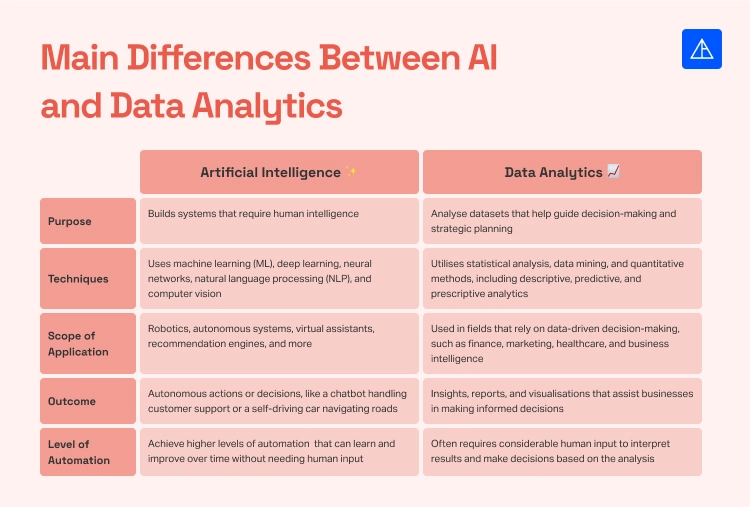The expansion of data analytics has been greatly influenced by the increased prominence of artificial intelligence. AI improves data analytics with more sophisticated and efficient processing of large datasets. The collaboration between artificial intelligence and analytics is driving substantial change across industries. It’s sparking new ideas and making businesses work better. Companies can get deep insights, make smarter choices, and keep pace with the rapidly evolving tech industry with AI-driven analytics.
Before we delve into the importance of upskilling in this field, let’s first explore the distinctions between artificial intelligence and data analytics, their interconnections, the most recent trends, and personalised learning pathways for individuals at various career stages and those new to the field.
Related: How to Get Started with Data Analytics
AI vs. Data Analytics: What Sets Them Apart
Let’s uncover what sets AI and Data Analytics apart.

Artificial Intelligence
- Builds systems that require human intelligence like solving problems, learning, understanding language, and recognising patterns.
- Uses techniques like machine learning (ML), deep learning, neural networks, natural language processing (NLP), and computer vision to replicate human intelligence.
- AI applications are broad, extending across fields such as robotics, autonomous systems, virtual assistants, recommendation engines, and more.
- Often results in autonomous actions or decisions, like a chatbot handling customer support or a self-driving car navigating roads.
- Seeks to achieve higher levels of automation, with systems that can learn and improve over time without needing human input.
Data Analytics
- Conducts in-depth analysis of datasets to discern patterns, correlations, and insights that facilitate informed decision-making and strategic planning.
- Utilises statistical analysis, data mining, and quantitative methods to process and interpret data. It involves descriptive analytics to summarise what has happened, predictive analytics to forecast future outcomes, and prescriptive analytics to recommend actions to achieve desired outcomes.
- Used in fields that rely on data-driven decision-making, such as finance, marketing, healthcare, and business intelligence.
- Typically produces insights, reports, and visualisations that support businesses in making well-informed decisions.
- The interpretation of results and decision-making based on the analysis often necessitate substantial human input.
Connecting AI and Data Analytics
Let’s explore how AI and Data Analytics connect and interact:
Data-Driven Decision Making
Artificial intelligence and analytics both depend on data. AI systems require large datasets to train models and improve precision, while data analytics focuses on examining data to uncover valuable insights.
Machine Learning
Machine learning is where data analytics methods are used to develop AI models. Predictive analytics often uses machine learning algorithms to forecast future trends.
Big Data Utilisation
Large volumes of data, often called Big Data, are processed in both fields to extract valuable insights. Artificial Intelligence uses Big Data to train complex models, improving its capacity to understand and replicate human-like intelligence.
Improving Business Operations
AI automates tasks and processes, and data analytics offers valuable insights to enhance and optimise these processes.
Enhanced Customer Experience
AI interacts directly with customers through tools like chatbots and recommendation engines while data analytics helps businesses understand customer behaviour and preferences to improve the overall experience.
Trends and Innovations in AI and Data Analytics to Watch
Keep up with the latest trends and innovations in AI and Data Analytics. Here’s what to watch for:
Generative AI
OpenAI’s GPT-4 and similar AI models can create text that looks human-like, make images, and even come up with new product designs by learning from patterns and user inputs. They are changing the game for content creation and automation.
Example: Agoda, the online travel agency, is using generative AI to step up its customer service and make its operations smoother. According to IT News Asia, Agoda is working on over 60 AI-driven projects to refine its processes and make customer interactions more personalised.
Explainable AI
It’s important to be clear and accountable as artificial intelligence becomes increasingly part of how businesses run. Explainable AI (XAI) is key in helping both businesses and customers see how AI systems make decisions. This understanding is crucial for building trust and making sure rules are followed, especially in fields like finance and healthcare.
Example: AI tools are becoming more common in healthcare to help diagnose medical conditions. According to a report by The Enterprisers Project, AI systems check MRI scans to find possible cancerous spots. However, the decisions made by AI carry a lot of weight. Explainable AI makes sure that doctors can understand and check how the system came to its conclusion when an AI system suggests a diagnosis. This openness is crucial for confirming the AI’s suggestions and provides a basis for any needed human intervention.
Edge AI
Edge AI is gaining popularity because it processes data directly on devices instead of sending it to centralised cloud systems. This approach cuts down on latency and improves real-time data processing, which is especially useful for applications like autonomous vehicles and smart devices.
Example: NVIDIA Jetson platforms drive cutting-edge AI in robotics and self-driving vehicles by handling data locally, which makes operations faster and more reliable.
Why Choose Customised Training for AI and Data Analytics?
Beginner-Friendly Training Content
Training programs for artificial intelligence and analytics that are customised to meet the specific needs of organisations or individuals are available. They include specialised modules covering the latest trends in AI, generative AI, and advanced data analytics like machine learning, deep learning, predictive analytics, and big data. Vertical Institute provides a strategic pathway to high-paying job opportunities, offering practical and beginner-friendly training courses that allow you to launch your tech career smoothly.
Hands-On Experience
These programmes usually focus on practical experience with hands-on projects and real-world case studies. Participants work with actual data sets and scenarios relevant to their industry, applying theoretical knowledge to solve real problems. Vertical Institute alumnus Rahim Mohammad shared his experience after completing the Data Analytics Bootcamp, “The hands-on project was a game-changer, allowing me to tackle real-world data challenges. From analysing trends to predicting customer behaviour, I’ve learned how data-driven insights power smart decision-making. A huge shoutout to our amazing instructors at Vertical Institute for the support.” You can read more about our alumni success stories.
Collaboration with Industry Leaders
Custom training programmes frequently partner with prominent tech firms and educational institutions to offer cutting-edge content. For instance, initiatives like Singapore’s SkillsFuture programme demonstrate how government-backed partnerships with tech companies and universities can provide tailored training to boost skills in emerging fields like AI and data analytics.
Flexible Delivery Formats
Training programs come in a variety of formats to fit different learning styles and schedules. You can choose between in-person workshops, online courses, and hybrid models. This flexibility allows you to learn without interrupting your work schedule. Vertical Institute’s flexible, part-time courses in Singapore are an excellent option for both career switchers and beginners, providing personalised learning experiences to fit your needs.
Ongoing Support and Resources
Custom training often comes with ongoing support, including access to expert networks, extra resources, and follow-up sessions. This ensures participants can keep learning and effectively apply their new skills in their roles. Vertical Institute’s Job Placement Assistance (JPA) is designed to connect graduates with potential employers, offering support in finding industry positions and internship opportunities. This initiative helps alumni navigate the job market and secure relevant roles in their field.
Conclusion
Artificial intelligence and analytics cover a wide range of applications and offer plenty of exciting opportunities for people at all career stages. Whether you’re just starting or looking to advance, these areas provide a lot of room for growth and innovation. Getting additional skills is a key way to gain the knowledge and expertise needed to do well and keep up in these fast-changing tech industries.
About Vertical Institute
Vertical Institute stands at the leading edge of evolving work landscapes. Our core mission is to prepare individuals with the vital skills necessary for future career success. We are dedicated to providing advanced tech education and cultivating leaders, innovators, and changemakers through our premier technology courses and certifications.
As a certified Approved Training Provider (ATO) recognised by SkillsFuture Singapore (SSG) and the Institute of Banking & Finance Singapore (IBF), Vertical Institute offers state-of-the-art, government-subsidised tech courses. Participants in our programs are eligible for SkillsFuture Credits and NTUC UTAP Funding, which helps alleviate education costs.



